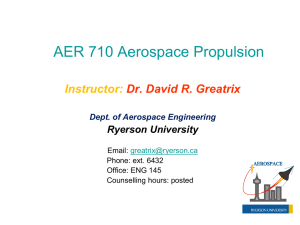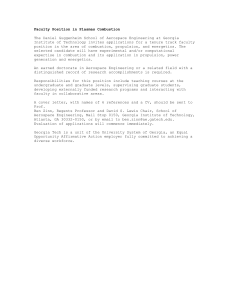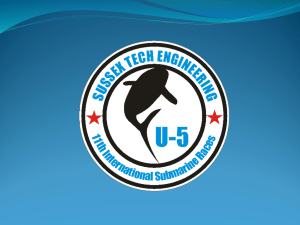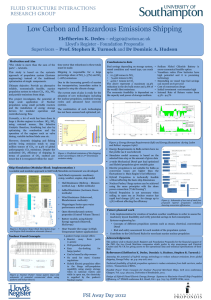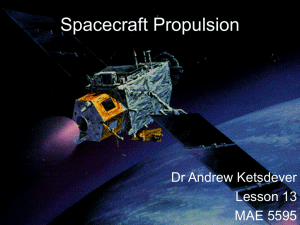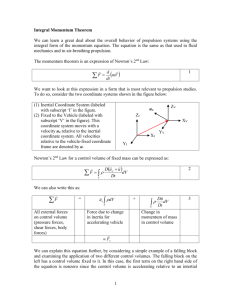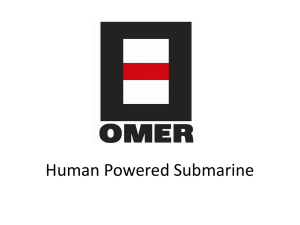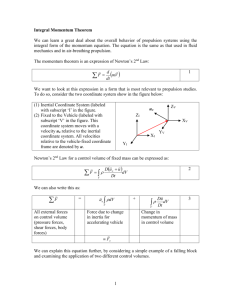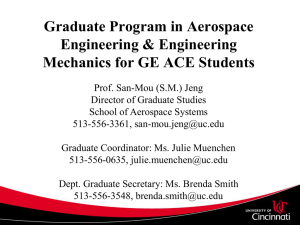JANNAF Journal Technical Scope
advertisement
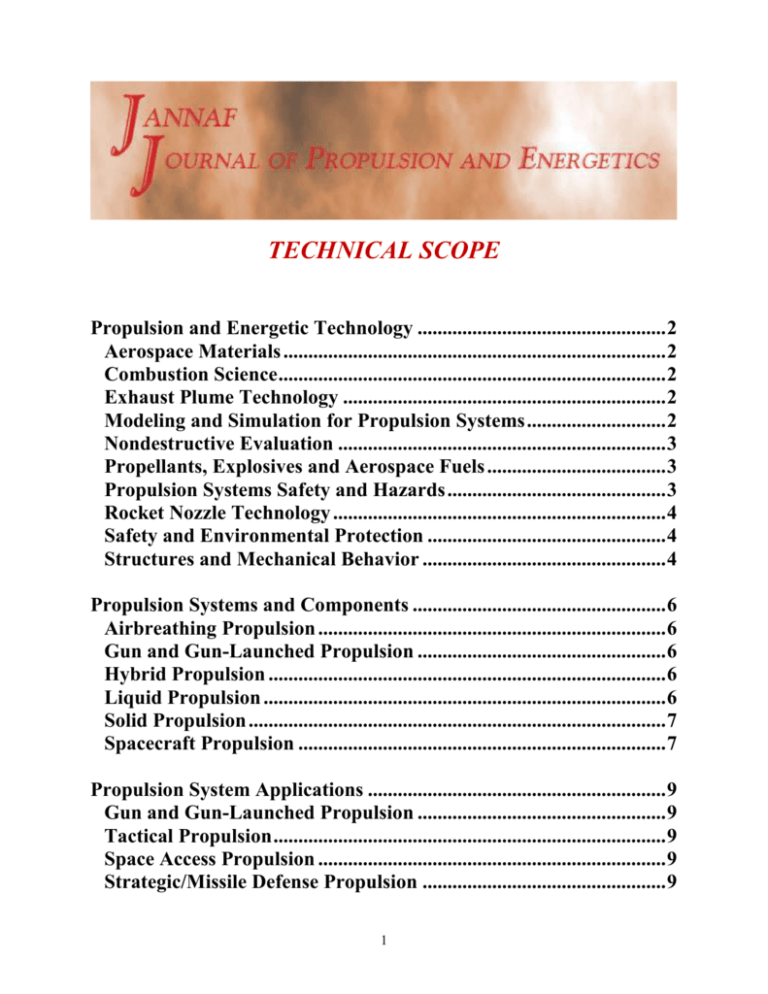
TECHNICAL SCOPE Propulsion and Energetic Technology .................................................. 2 Aerospace Materials ............................................................................. 2 Combustion Science .............................................................................. 2 Exhaust Plume Technology ................................................................. 2 Modeling and Simulation for Propulsion Systems ............................ 2 Nondestructive Evaluation .................................................................. 3 Propellants, Explosives and Aerospace Fuels .................................... 3 Propulsion Systems Safety and Hazards ............................................ 3 Rocket Nozzle Technology ................................................................... 4 Safety and Environmental Protection ................................................ 4 Structures and Mechanical Behavior ................................................. 4 Propulsion Systems and Components ................................................... 6 Airbreathing Propulsion ...................................................................... 6 Gun and Gun-Launched Propulsion .................................................. 6 Hybrid Propulsion ................................................................................ 6 Liquid Propulsion ................................................................................. 6 Solid Propulsion .................................................................................... 7 Spacecraft Propulsion .......................................................................... 7 Propulsion System Applications ............................................................ 9 Gun and Gun-Launched Propulsion .................................................. 9 Tactical Propulsion ............................................................................... 9 Space Access Propulsion ...................................................................... 9 Strategic/Missile Defense Propulsion ................................................. 9 1 Propulsion and Energetic Technology Aerospace Materials Combustion Science Guns Ignition and Combustion of Gun Propellants Solid Propellants and Combustion Decomposition, Ignition, Kinetics, Combustion and Extinguishment of Ingredients & Propellants Failure Analysis of SRMs Solid Propellant Combustion Instability Metal Combustion Combustion, Prediction and Performance in SRMs Solid Rocket IHPRPT Combustion Technologies Reactive Materials Explosive Performance/Enhanced Blast Performance and Blast Modeling Diagnostics and Test Airbreathing Combustion Combustion Diagnostics Liquid, Hybrid and Novel Propellants & Combustion Dynamics Liquid and Gaseous Propellants Monopropellants, Bipropellant and Hybrids Hydrogen Peroxide Underwater Propulsion Exhaust Plume Technology Exhaust Plume Flow Field Analysis Exhaust Plume Radiation Exhaust Plume Effects Other Exhaust Plume Related Problems SPIRITS User Group Target Signature Phenomenology Atmospheric Transmission/Radiation Code Development Instructional Tutorials Modeling and Simulation for Propulsion Systems Virtual Engineering System Engineering Integrated Health Management Uncertainty Assessment and Management 2 Nondestructive Evaluation Manufacturing and Inspection Technology Monitoring and Control Automated NDE Sensing for quality control and conformance Embedded Sensing NDE Static Test Methods NDE Standards NDE for Health Management NDE in Service Life and Aging Post Acceptance Strategic Sustainment Advanced Imaging NDE Systems Propellants, Explosives and Aerospace Fuels Liquid Propellants Propellant Process Engineering Solid Propellant Chemistry Test Methods Solid Propellant Ingredients Propellant Surveillance and Aging Gun and High Gas Output Devices Green Energetic Materials (GEM) Reactive Materials Explosives and Other Topics Propulsion Systems Safety and Hazards Thermal Decomposition and Cookoff Thermal Decomposition, Ignition and Combustion Cookoff Hazards Assessment and Mitigation Violent Reaction and Detonation Rocket Propellants Hot Spot Initiation from Shock and Impact Detonation Phenomena Energetic Material Response to Shock Loading Projectile Impact Bullet/Fragment/Shaped-Charge Jet Impact Assessment and Mitigation Gun Propellant Vulnerability Gun Propellant Vulnerability Propulsion System Safety, Hazard Classification & Insensitive Munitions Hazard Classification of Large Motors Insensitive Munitions & Hazards Classification Threat Hazard Assessment Hydrogen Peroxide Hazards 3 Rocket Nozzle Technology Structural Analysis and Modeling Nozzle Design, Test and Evaluation Evaluation, Health Monitoring Design Lessons Learned Test New Materials In-Process Characterization Techniques and Instrumentation Thrust Management Control Low Cost/Low Weight Nozzles and Materials Thrust Vector Control Reduction of Weight, Volume, Cost IHPRPT MEMS Safety and Environmental Protection Toxicology Atmospheric Dispersion Modeling and Hazards Instrumentation Environmental Industrial Hygiene Range Safety and Explosive Safety Packaging, Handling and Transportation Pollution, Prevention, Waste Management, Hazardous Materials Control & Waste Management Demilitarization, Reclamation and Reuse Technologies Review of Accidents and Incidents Structures and Mechanical Behavior Service Life Aging Limiting Factors for Propulsion Systems and Components Development Approaches Motor Monitoring, NDE Hazards Material Properties and Characteristics Gun Tube Erosion, propellant effects Fundamental Molecular Modeling of Gun Tube Erosion Test Methods for Liquid Engine & Components Test Methods for Propellant Case or Component Construction Material Property Optimization Test Equipment and Procedures, Instrumentation, Data Acquisition, Reduction, Analysis Test Specimen Preparation Mechanical Properties related to Hazards Structural Analysis and Design 4 SOA Structural Analysis Techniques Non-linear Elastic-Plastic Analysis Predictive Modeling Health Monitoring Analysis Methods Experimental Structural and Mechanical Analysis and Test Experimental Methods Experimental Stress Analysis Validation of Stress and Failure Analyses Structural/Ballistic Interactions Statistical Considerations of Stress Analyses Analysis and Test Methods for Motors, Nozzles, Guns Fundamental Chemistry of Gun Barrel Materials and Combustion Products Interaction Macroscopic Erosion of Gun Tube Wear Defect Evaluation Predicting Crack Growth and Cumulative Damage Crack Propagation and Fracture Theory Pressure Driven Structural/Ballistic Interaction Fracture Mechanics and Fracture Characterization Failure Investigation Tools and Methodologies 5 Propulsion Systems and Components Airbreathing Propulsion Conventional Ramjets Scramjets Scramjet Structures Propulsion Structures and Materials Airframe Structures and Materials Scramjet Component/Engine Testing Combined/Advanced Cycle Propulsion Small/Expendable Turbopropulsion Fuel Technology Component Modeling & Simulation Propulsion Code Validation Component Analysis Gun and Gun-Launched Propulsion Hybrid Propulsion Liquid Propulsion Liquid Engine Systems System Trade Studies Health Management and Controls Test Practices and Standards Advanced Materials and Fabrication Processes, Characterization and Applications Long Life, Reusable and Long-Duration Engine Design and Integration Small Launch Vehicle Engines Liquid Combustion Subsystems and Components Hydrocarbon Fuel Characteristics and Specifications Advanced Liquid and Gel Propellants Thrust Chamber Assembly (TCA) Design and Applications Liquid Propellant Feed and Pressurization Turbomachinery Design and Applications Pressurization and Feed Subsystem Design and Applications Tactical Liquid and Gel Propulsion Systems Mission Trade Studies System and Component Analysis and Trades Specific Tactical Propulsion Systems System Safety, Handling, Transportation and Environmental Issues 6 Solid Propulsion Spacecraft Propulsion Advanced Chemical Propulsion Advanced Propellants Propellant management Lightweight Components and Manufacturing Technologies Aerocapture Rigid Aeroshell Inflatable/Deployable Electric Propulsion Basic Research of Electric Propulsion Thrusters (EPTs) System Engineering of EPTs EPT Applications EPT Flight Programs Modeling of EPTs and Integration Nuclear Thermal Propulsion Nuclear Thermal Rocket (NTR) design Solid Core NTR Reactor Design Nuclear Fuel Options Reactor Controls and Shielding NTR Test Methods and Facilities NTR Demonstration Options Safety, Reliability, Risk NTR Vehicle Operations and Cost Solar Sails Mission Concepts Innovative Sail Designs and Concepts Technology Testing Sail Packaging and Deployment Guidance, Navigation and Control Sail Materials and Dynamics Environmental Issues Solar Thermal Propulsion Mission Concepts and Applications Engine Concepts Engine Structures, Materials and Insulation Reflectors Engine/Concentrator Integration and Alignment Sun Acquisition, Tracking and Pointing Future Technologies Fusion Energy 7 High-Energy Fuels Antimatter Laser or Microwave Mass Drivers Tether Systems Momentum Exchange Electrodynamic Reboost (MXER) Electrodynamic (ED) Tethers Analysis of Performance 8 Propulsion System Applications Gun and Gun-Launched Propulsion Conventional Unconventional Trade Studies/Analysis High Operating Pressure Concepts Assisted Projectiles Assisted Guided Munitions Insensitive Munitions Tactical Propulsion Airbreathing Hybrid Solid Propellant Demilitarization Hypersonic Improved Missile Kinematics Insensitive Munitions Propulsion System Product Improvement Space Access Propulsion Airbreathing Rocket-Based Chemical Spacecraft Strategic/Missile Defense Propulsion Strategic Systems Ground-Based Missile Defense Sea-Based Missile Defense Advanced Propellants Insensitive Munitions Energy Management Dual Mode Systems (Airbreathing/Rocket) Post Boost Control May 2006 9
